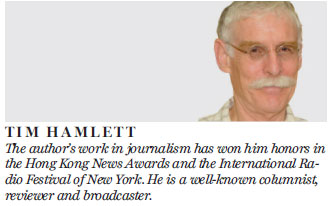Time to re-focus on other serious issues facing SAR
Updated: 2015-06-16 08:56
By Tim Hamlett(HK Edition)
|
|||||||
What next after the upcoming constitutional cataclysm? The government, we are told, will drop constitutional reform for a while and concentrate on "economic and livelihood issues". This is a good idea, but it needs to be done in the right way.
This must start with the recognition that a substantial part of the population are not enchanted by the main public objective offered in the past year. Many of them are young.
But there is a lot of idealism there which could be harnessed to worthy objectives if the government gave a lead. This needs careful choices and a change of tone. Many observers have the impression that our leaders feel more joy in the construction of huge concrete objects - runways, roads, bridges, tunnels - than in a serious effort to overcome want and hunger in our society.
Without asking anyone to pay lip service to localism, we need an objective in Hong Kong for the people's benefit. Participation in five-year plans is important. So is Pearl River Delta integration. But as a banner for a crusade they both look too much like something we do because other people tell us to.
The example to follow is that of the French King Henry IV, who ended the Wars of Religion by making a patently insincere conversion to Catholicism and devoted his subsequent reign to putting "a chicken in every pot". We have higher expectations these days, but there are, I fear, quite a lot of people in Hong Kong who cannot now afford chicken.
What might this look like? Let us start with health. Every poll agrees that what Hong Kong people want in this line is a universal service free at the point of delivery. Modest charges to deter frivolous use of valuable facilities are acceptable. Asking some people to pay for their own drugs as we do now is not. If the government adopted this objective it would not make a huge difference on the ground. We already have numerous excellent hospitals. Stop muttering about getting people to buy insurance. This sounds like an attempt to shrug off responsibilities by switching to the American system, widely known to be the most expensive and dysfunctional in the developed world. Complaints about the aging population can also cease. The main influence on Hong Kong's population patterns is migration, and this is not predictable.
So let us set as a target a public health system to keep us all fit for the 21st century.
Education is in a similar state. Actually we have a good system but we constantly talk as if we want to privatize it, shrink it, or provide a separate arrangement for the rich. What would our dream education system look like? Not unlike what we have now. The road to improvement is widely known but rarely followed. Success in teaching overwhelmingly depends on the personal qualities of the teachers. How do we attract quality people to teaching? Less bureaucracy, better pay and more esteem. Most of our teachers come from the Hong Kong Institute of Education. There is no good reason why this is not called a university, for a start.
Then there is the question of pensions. Hong Kong can afford to provide a decent pension. Everyone seems to know this except the financial secretary. It doesn't have to be generous but we need to put an end to the 80-year-old cardboard collection syndrome. The MPF alone will never solve this problem because the obstinate fact about retirement is that none of us knows how long it will last.
Labor rights: We all favor a day's work for a day's pay but far too many employers expect a couple of hours of unpaid overtime as of right. Leaving it up to contract negotiations is an ill-informed non-solution. A government which had the guts to force standard working hours down the throats of protesting plutocrats would win huge applause.
So what about it: Hong Kong as a humane society? The first objection will be that this is expensive. Well it is about time something was. We do not know what the effect on the economy is of a government persistently running a massive surplus, because this is not something that comes up often. But it probably isn't good.
Actually it isn't so much about what we do as the way we describe it. Take homes for the elderly. After recent scandals we will no doubt be told in the next budget, or the next policy speech, that X,000 new places will be provided at a cost of HK$X million. Nobody knows what this means for them. Will granddad be able to get a place or not? We still don't know.
Give us a meaningful target: There will be homes for everyone who needs one by 2020. Too difficult? Better to aim high and drop a bit short than to muddle along responding to the clamor of each passing hour.

(HK Edition 06/16/2015 page11)